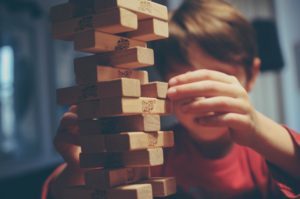Have you ever wondered what play therapy for children really is or how it is different from typical playing? And how playing can make a positive impact on children?
 Of course, you do play with your children in play therapy, but it’s more than that. Therapists who specialize in play therapy use many forms of play as a method and modality of treatment for children.
Of course, you do play with your children in play therapy, but it’s more than that. Therapists who specialize in play therapy use many forms of play as a method and modality of treatment for children.
It’s no surprise that children learn about and process the world through play. Playing through problems is equal to adults talking through problems. Therefore, children interacting with therapists through play therapy is equivalent to adults having conversations with therapists.
When play is used in therapy, a child has the ability to grow, develop skills for communication as well as pro-social techniques, learn about the world and how to manage emotions, and more. There is evidence that using play therapy with children can help them heal effectively so that they have long-term happiness as an adult.
Many philosophers dating back to Plato’s time have documented how important play is in the development of a child. This is because play can help children learn about their environments and how to interact with them. Santa Monica Christian Counseling supports families by offering guidance on fostering healthy emotional and developmental growth through play.
In the 1920’s, Hermine Hug-Hellmuth was the first person to use play therapy in a formal psychological practice. Children were put in a therapy room alongside the therapist so that they could express themselves. Hug-Hellmuth realized that children’s feelings and thoughts could be analyzed through play better than having conversations with them.
 Play therapy has evolved since the 1920’s and is now a widely used method of gaining insight into the thoughts and feelings of children. Psychologists and researchers have been able to come up with several play techniques that help children deal with the emotional impact of struggles they are facing.
Play therapy has evolved since the 1920’s and is now a widely used method of gaining insight into the thoughts and feelings of children. Psychologists and researchers have been able to come up with several play techniques that help children deal with the emotional impact of struggles they are facing.
Today, there are several established evidence-based methods of play therapy. These include play therapy with sand, play that is both directive and non-directive, play that is based on cognitive behavioral therapy, and more.
Play therapy is normally used when treating children who are under the age of 12 or until it is decided that the child is thinking concretely. Other research has shown that play therapy is also effective for some children who are over the age of 12 as well as some adults.
Play therapy tends to be an effective method of treatment because the child is allowed to express him- or herself to the therapist in a non-threatening, relaxed way. Instead of an interrogation, it seems more like playtime for the child.
Through play therapy, a child is able to process situations in a non-verbal way, including drawing, therapeutic storytelling, role-playing, creative visualization, and even by movement or activities like dancing. The development stage that a child’s brain is in heavily influences why non-verbal interactions can be more beneficial than those of talk therapy.
Think about it – Have you had any experiences where you asked a child why he or she is behaving in a certain way, and the response you got was “because” or “I don’t know?”
Children often answer these kinds of questions that way, not because they don’t want to be in trouble, but because they don’t have fully developed verbal processing skills. Expressing the reason for why they did what they did is difficult and they may be unable to communicate with adults by verbalizing their feelings and thoughts about whatever situation they are in.
 The frontal lobe is the area of the brain that we use to process complex emotions and thoughts as well as regulate emotions. A child’s frontal lobe hasn’t completely developed yet. In fact, it takes until the late 20’s for a frontal lobe to fully develop. Events that children experience get stored in non-verbal regions of the brain, which renders them unable to verbalize their emotions to adults.
The frontal lobe is the area of the brain that we use to process complex emotions and thoughts as well as regulate emotions. A child’s frontal lobe hasn’t completely developed yet. In fact, it takes until the late 20’s for a frontal lobe to fully develop. Events that children experience get stored in non-verbal regions of the brain, which renders them unable to verbalize their emotions to adults.
These non-verbal regions of a child’s brain are also where traumatic experiences and situations get stored, so it is difficult for him or her process them verbally. This includes the inability to process his or her thoughts and emotions towards them. Talk therapy could, therefore, be ineffective since a child is unable to heal from trauma through talking.
Non-verbal interaction with things like sand trays, drawing, and role-playing can help children express trauma without having to use words.
Many therapists choose to use play therapy when treating children because it correlates to their brain’s processing skills and development. Children are able to heal and discover new methods of emotion handling that will have a lasting impact in their adulthood instead of eliminating symptoms temporarily.
Which Symptoms Can Play Therapy Effectively Treat?
There is a lot of proof that play therapy for children works for children who have all kinds of mental health diagnoses and various symptoms. Therapists use play therapy with children of any age and some adults also benefit from it.
Play therapy can help children who have behavioral disorders like conduct disorder or oppositional defiant disorders learn ways to deal with their emotions while maintaining respect for those around them. Children who have been diagnosed with ADHD can be taught methods of controlling their energy so that they can turn it into a positive thing.
Play therapy can help clients who have anxiety disorders like OCD because it can teach them how to improve confidence and overcome anxiety. Developmental disorders like Autism Spectrum Disorder also benefit from it, as children can learn to interact with other people and gain the skills needed to live independently.
Play therapy can be used to treat children who are currently in a traumatic crisis or situation, grieving the death of a family member or close friend, or dealing with their parents’ divorces.
Children do not have to have a formal diagnosis in order to benefit from play therapy. It has also shown exceptional results in children who exhibit depression, learning disabilities, withdrawal from society, social anxiety, communication issues, defiance, fear, tantrums, anger, and many more.
What Long-Lasting Impact Can Play Therapy Have on My Children?
 In order for therapy to be a “success,” the children need to find methods to identify emotions and then process them in a healthy way.
In order for therapy to be a “success,” the children need to find methods to identify emotions and then process them in a healthy way.
Children will need to apply the tools they’ve developed in therapy to whatever chaos and traumatic situations they are in outside the “safe” environment that therapy provides. For this to work, however, children need to learn these skills, understand them, and constantly practice them.
Play is a tool children use to process their emotions, learn new skills, and practice what they’ve learned. This can help them at the present time but also in the future. By utilizing play when children are young, they can gain skills they can keep practicing that will carry on into adulthood.
What Long-Term Impacts Will This Have on My Child?
Play therapy provides children with a plethora of long-term effects. It assists children in building skills that help them understand their own emotions and the emotions of other people. When given these tools, children are able to work through social situations, lower their anxiety, improve confidence levels, and more.
In addition to understanding emotions, play therapy also teaches children how to express their emotions in a healthy way as opposed to angry tantrums and defiance. It helps children understand that emotions are normal and everyone experiences them.
Children are taught ways to express strong emotions such as anger without screaming, violence, or tantrums. These skills are very important in adulthood when the child builds all kinds of relationships including family, romantic, social, and workplace relationships.
Play therapy can teach children how to take responsibility for their behaviors and create healthy methods of dealing with strong emotions. Play therapy helps them come up with creative and productive solutions to issues that eventually will help in the navigation of relationships and the child’s future success.
Children will develop respect for other people as well as themselves and they will also learn that they can’t change certain things and they need to accept that. Play therapy provides children with a safe environment where there is empathy and understanding of everyone’s feelings.
Play therapy helps improve confidence, which will, in turn, help children be confident when it comes to changing and growing as a person. These skills are all products of successful play therapy that can help children grow into successful, high functioning, and healthy adults.
What Long-Term Impacts Will this Have on My Family?
Play therapy provides numerous benefits for children, but it can also be very beneficial for the households they live in. If a child exhibits constant tantrums, it can put a lot of stress on the family; however, if the child learns skills for self-control, this relieves the entire family. As we all know, a child’s environment greatly impacts him or her, and in order for play therapy to work in the long-term, the child’s environment must change to accommodate the new skills.
Of course, the family unit is the environment a child spends the most time in. Therefore, family units must also develop and grow alongside children so that the skills the child has learned will have a lasting impact.
Keeping healthy relationships within the family is important, and spending 15 minutes every day engaging in playtime with each child individually is the standard that is recommended.
There are different kinds of play therapy including Parent-Child Interactive Therapy, which is when the parents or caregivers play with their children in the presence of a therapist. The therapist guides and teaches the adults how to play in a productive manner that also teaches discipline.
It gives the adults skills for how to play with children in a child-centered way, which in turn will help children develop confidence, self-esteem, independence, and more. Parents and caregivers also learn effective methods of disciplining their children if commands are not followed. Proper discipline techniques can assist children to behave because they know how to deal with feelings and boundaries, not because they are scared.
Long lasting, positive effects have a high rate of success when the exact same boundaries are set in the child’s environment as they are in the therapy setting. Parents and caregivers who learn how to play with children effectively will observe more obedience, less stress and chaos, more responsibility, a stronger family bond, and more.
How Do I Find a Therapist Who Offers Play Therapy for Children?
If you think your child might benefit from play therapy and the skills it provides, look for a therapist locally. If you are in the Seattle, Washington area and need a skilled therapist who can include Christian values in play therapy, visit Seattle Christian Counseling.
We are trained in therapy for children, including play therapy and child development. Don’t wait to get therapy for your child. Reach out to a counselor at Santa Monica Christian Counseling to set up an appointment for you so you can begin learning new skills that will help you and your child heal.
“Let’s ride,” courtesy of Kelly Sikkema, unsplash.com, CC0 License; “Jenga,” courtesy of Michal Parzuchowski, unsplash.com, CC0 License; “Coloring time,” courtesy of Aaron Burden, unsplash.com, CC0 License; “Emotions,” courtesy of Alexas_Fotos, pixabay.com, CC0 License


